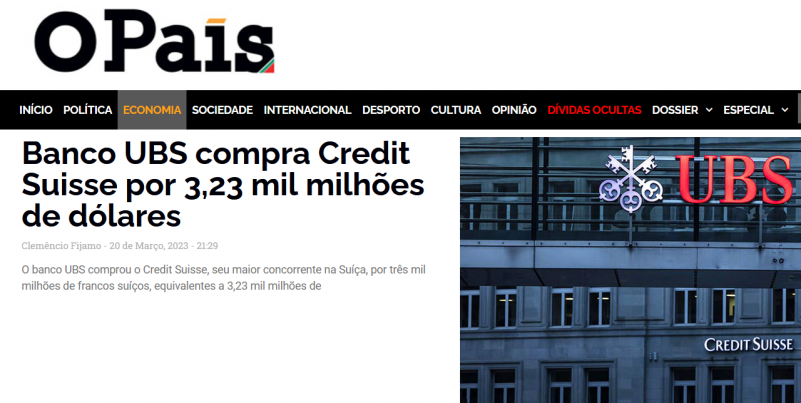Share post now
Article
Credit Suisse vs. Global South
24.03.2023, Finance and tax policy
What does Pakistan have to do with a bank in Silicon Valley which invests short-term client funds in long-term paper, the value of which diminishes when interest rates rise?

The Mozambican press has also picked up on the collapse of CS. In Mozambique, the Swiss bank has caused great damage in the past.
© O Pais
And what does Bolivia have to do with the fact that a bank in Switzerland has been chalking up one scandal after another for over 10 years now? That's right, absolutely nothing. But yet they suffer the consequences.
So Credit Suisse has now been thrust into the embrace of UBS, and the US-European banking crisis is momentarily on hold. Its repercussions will be felt in the Global South for some time to come. This is so because investors in the North are now shunning government bonds from highly indebted countries in the South. There is a stock reaction to any sign of trouble in global financial markets: investors discover with astonishment that there are indeed risks. They demand higher returns on investments with greater risk, whether real or feared, or they simply go on a buyer's strike. "Risk appetite for distressed emerging-market credit has collapsed, as the market looks at these guys as the weakest links and highly susceptible to a sudden stop," a London trader is quoted by Bloomberg as saying. This can result in State bankruptcies or force countries to offer higher yields on their government bonds in order to attract buyers – the effects do, therefore, tend to linger over time.
It is worth noting that banks like CS, which push credit-ridden countries ever closer to the edge, are the very same ones whose asset management services offer tailor-made tax evasion solutions to wealthy clients from Asia, Africa and Latin America. The irony is that even in the wake of the CS debacle, this private banking, of all things, is again being viewed as the best way forward for the Swiss financial centre. At least outwardly, the current motto of the new banking behemoth UBS is: stick to what you know best, and get out of the financial casino of investment bankers. For millionaires from countries in the Global South, where there is no automatic exchange of information (AEOI) with Switzerland, Paradeplatz is still a special place. For them, the good old banking secrecy remains in place.
It is yet to be seen just how serious UBS really is about leaving the casino and engaging in risk-free business. The Financial Times has reported that UBS wanted to reverse the sale of CS's investment bank "First Boston", which had already been decided. Risk is always very much a matter of perspective. UBS's investment banking entity in Brazil, which operates in partnership with the State-owned "Banco do Brazil", is a meat industry and agribusiness fat cat. For land rights activists, the biodiversity, or sloths, that business is by no means "risk-free".
Back to Credit Suisse: Besides the structural damage it has just helped to cause for the Global South, the bank had also ruined the lives and futures of the people of Mozambique quite directly. The Credit Suisse scandal with the highest number of victims is also the one that is currently being reported on the least. Of course, considering that the 470 million-dollar fine paid in that connection by Credit Suisse in the USA for corruption only ranks 7th on the list of fines levied on the scandal-ridden bank in that country. And it was only about corrupt loans worth a billion dollars – one-tenth of its deals with the criminal investment company Greensill Capital. And in Mozambique, it was not wealthy hedge fund clients who lost money, but only about a million people who were plunged into absolute poverty on the back of the sovereign default provoked by Credit Suisse in 2016.
Unfortunately, even after the takeover, there is no "all-clear" when it comes to direct losses. Although not penalised for it, UBS inflicted millions in damage on the dirt-poor country of Papua New Guinea through shady-to-criminal business dealings by its investment bank in Australia. In the South, nothing new means fearing the banking behemoth.
